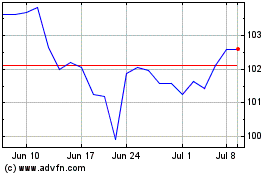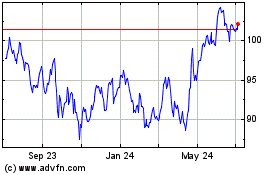By Jennifer Maloney and Cara Lombardo
Marlboro makers Philip Morris International Inc. and Altria
Group Inc. are in advanced talks to merge, a potential blockbuster
deal that would reunite two tobacco giants struggling with
shrinking demand.
The two businesses hold the same portfolio of cigarettes,
including industry leader Marlboro, one of the world's best known
brands. The products are sold by Altria in the U.S. and Philip
Morris elsewhere. A combination would create a $200 billion-plus
behemoth.
But the companies have been struggling with declining cigarette
sales as fewer adults smoke and new electronic cigarettes like Juul
steal away some smokers. Altria invested $12.8 billion to take a
large stake in Juul last year.
The talks were partly sparked by U.S. authorization in April of
a cigarette alternative that Altria and Philip Morris will sell
together, starting in September, according to people familiar with
the matter.
They are also motivated by the risks -- and opportunities --
that Juul presents for both companies as the startup woos cigarette
smokers and expands outside the U.S., the people said.
Based on Monday's closing prices, Philip Morris has a market
capitalization of about $121 billion, while Altria sports a market
capitalization of roughly $88 billion.
The two sides are discussing an all-stock deal with no premium
based on where the two companies' shares have been trading
recently, according to people familiar with the matter. Philip
Morris would control about 59% of the combined company under the
terms currently being discussed, some of the people said.
The companies are still negotiating over the leadership and name
of the business, the people said, but could reach a deal within
weeks.
Philip Morris, which Altria spun off more than a decade ago,
said the companies were discussing an all-stock merger but could
give no assurance that the talks would lead to any agreement.
Altria issued a similar statement.
Shares of Altria fell 1.8% to $46.29 in recent trading Tuesday,
while Philip Morris fell 3.7% to $74.82.
While Philip Morris and Altria's businesses have traditionally
been divided between the U.S. and the rest of the world, those
lines have been blurring in recent years as each company searches
for growth beyond Marlboros. Philip Morris had nearly $30 billion
in annual sales last year, while Altria brought in nearly $20
billion.
Both companies have warned that cigarette shipments were
declining faster than expected, both in the U.S. and other big
markets such as Japan and Russia. Last month, Altria said more
people were using e-cigarettes exclusively than it had expected.
Philip Morris, meanwhile, earlier this year lowered its earnings
forecast for 2019.
Juul, with Altria's backing, has launched in more than a dozen
international markets where it threatens to hurt Philip Morris's
cigarette sales.
Philip Morris and Altria have also partnered on their own
cigarette alternative, a device called IQOS that heats but doesn't
burn tobacco. Philip Morris sells it in Japan, the U.K. and other
markets and Altria is set to launch it in the U.S. in
September.
Philip Morris has spent $6 billion since 2008 developing IQOS
and other next-generation products. Philip Morris CEO André
Calantzopoulos has said the company is shifting its focus to "a
smoke-free future" and could someday walk away altogether from
selling traditional cigarettes.
Altria CEO Howard Willard has gambled that investing in Juul, a
controversial startup whose sleek, nicotine-packed vaporizers are
popular with teens, will help the company keep up with a changing
market even if it cannibalizes sales of Marlboros. "Ten years from
now the majority of the tobacco products that are sold could very
well be noncombustible products," he said in an interview last
year.
That would mark a major consumer shift. U.S. sales of
cigarettes, cigars and smoking tobacco were nearly $107 billion
last year, compared with about $15 billion in sales of smokeless
tobacco and vaping products, according to Euromonitor International
estimates, which include web sales. Vaping products like Juul made
up $5.6 billion of those sales.
The potential combination brings the industry full circle from
the 2000s, when global players distanced themselves from the U.S.
market amid legal concerns. British American Tobacco PLC pulled out
in 2004 and Altria in 2008 spun off its overseas business as Philip
Morris International. But the litigation risks for cigarette makers
in the U.S. have receded since then.
Two years ago, BAT took over full control of Reynolds American
Inc., the second-largest player in the U.S. and maker of brands
such as Camel and Newport.
Although fewer people are smoking and cigarette shipments are
falling, U.S. tobacco profits have steadily grown as Altria and
Reynolds regularly push up prices. The U.S. generates the most
tobacco profits of any market outside of China, where tobacco is
controlled by the state.
In the U.S., the companies must navigate an overhaul of U.S.
regulatory policy in which the FDA is pushing to reduce nicotine in
cigarettes to nonaddictive levels and recently proposed putting
more graphic warning labels on cigarette boxes. At the same time,
the agency is trying to combat a surge in teen smoking rates,
caused by the popularity of e-cigarettes.
U.S. regulators and lawmakers have threatened to ban Juul
devices entirely if underage use continues to increase. The San
Francisco company recently opened Juul-branded retail stores in
Seoul and Toronto and is considering a sales launch of its
vaporizers in China as early as September.
Bonnie Herzog, a tobacco analyst at Wells Fargo, said Altria is
attractive to Philip Morris because of its 35% stake in Juul and
the possibility of capturing all profits from IQOS sales in the
U.S. Likewise, she said, Philip Morris could help with Juul's
overseas expansion.
Write to Jennifer Maloney at jennifer.maloney@wsj.com and Cara
Lombardo at cara.lombardo@wsj.com
(END) Dow Jones Newswires
August 27, 2019 15:01 ET (19:01 GMT)
Copyright (c) 2019 Dow Jones & Company, Inc.
Philip Morris (NYSE:PM)
Historical Stock Chart
From Mar 2024 to Apr 2024

Philip Morris (NYSE:PM)
Historical Stock Chart
From Apr 2023 to Apr 2024
